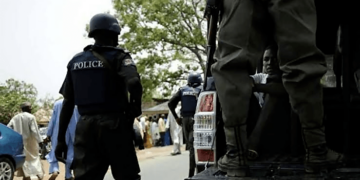Permutation, speculation and prediction are probably some of the best words to use to describe the varying comments by Nigerians on the 2023 General Elections scheduled for next Saturday 25th January in which over 93 million voters will participate. The natural anxiety and curiosity that have continued to define the attitude of the citizens to the elections are, more or less, clear signs of feelings of uncertainty about its outcome.
The nearer the elections, the more they appear different from the past ones in terms of absolute predictability as evident in the absence of any kind of precision in all the scientific analyses on the exercise. Almost all the events in the country that are currently leading to the elections are making the whole situation to look like a dark room in which Nigerians are trying to sort out themselves.
A lot of the concerns that are consistently being expressed are strongly informed by the proper realization of the implications of the prevailing political, economic, social and security realities in the country for the elections. There is a reason for every form of the approach adopted by the individual candidates or a group of them towards the elections that will produce the next set of the country’s leaders.
Apparently, the increased influence of religion and ethnicity as well as sectional consideration over the decisions of voters are vital issues for debate in various political circles. The ruling All Progressives Congress (APC), Peoples Democratic Party (PDP), Labour Party (LP) and the New Nigeria Peoples Party (NNPP) which are the major contenders are consistently associated with or even openly involved in the detestable manipulation of religious, ethnic and/or sectional sentiments of the people to realize their goals. The on-going political discourses at all levels are continuously dominated by these issues, which is the reason for the inability of analysts to arrive at a widely accepted scientific conclusion on what or how the outcome of the elections will be.
However, even with the numerous uncertainties over the manner and the circumstance in which the exercise will be conducted, especially considering the security and other challenges, there is a clear consensus among most Nigerians that it substantially promises to be the most defining of all the ones that preceded it. There is still the strong belief that the elections will definitely mark the end of the eight-year tenure of President Muhammadu Buhari who was elected on the platform of APC and usher in a new government that will be duly required to simultaneously allay fears and re-enforce confidence of the citizens.
The kind of consolation that is derived from this particular belief, though not enough to make Nigerians to overlook the challenges, somehow strengthens people’s resolve for effective participation in the process. It is with a great justification that the forthcoming elections are widely considered as potential game-changers that can guarantee the rectification of all the defects in the policy formulation and implementation processes, which have been the bulwark against the attainment of genuine national development.
Therefore, the noticeable poor approach to the exercise adopted by the various groups of stakeholders is, in the eyes of the optimists, absolutely unfortunate and should be subjected to sharp criticism so that all the dangers it portends for the country can be satisfactorily exposed. While most of the power-seekers or, more precisely, the contestants have appeared to be least cautious about issues that can cause injury to the polity, the reasonably concerned elements are persistently raising an alarm over those ugly aspects and, at same time, insisting on the adoption of a better method.
Perhaps, the reduction of the whole analysis to the individual presidential candidates will give a clearer pictures of the various dimensions of the contest and hopefully even provide the necessary foundations upon which some reliable conclusions can be built and sustained. Asiwaju Ahmed Bola Tinubu of the APC, Atiku Abubakar of the PDP, Mr Peter Obi of the LP and even Senator Rabi’u Musa Kwankwaso of the NNPP and their respective campaigners have been out there on the field trying to woo voters, in the process of which they are creating varying impressions in the minds of the people.
There are Nigerians who have firmly believed that the current happenings which will culminate in the conduct of the elections are a severe test for the country. Almost everything about Nigeria’s existence—national unity, political stability, economic prosperity, etc—are being challenged by a lot of the attitudes of the contestants as well as their respective parties and supporters.
The demand by the South-West for the emergence of the country’s next president from there on account of the fact that Buhari is a Northerner is seen as quite valid and therefore a good reason for which Tinubu should be elected. If this is added to the other fact that Tinubu in particular and the South-West in general, even it was for the promotion of their collective political interest, worked hard for the victory of a Northerner in 2015, the justification for the clamour for the election of the APC candidate becomes greater.
Moreover, it is only the election of a non-Northerner that is somehow regarded as the most effective measure towards the attainment of reasonable political stability across Nigeria. There is the expectation that as soon as a non-Northerner, particularly Tinubu, becomes president, most of the political agitations that continuously seek to weaken the fabrics of the country will either substantially subside or even completely fizzle out.
On his part, Atiku flaunts his achievements as a politician and businessman to make case for himself. It is also the judgement of the PDP and its members that Atiku is the best of all the other candidates considering his achievements as a former vice president of the country and an exceptionally successful businessman whose management skills have been properly acknowledged.
Both Obi and Kwankwaso have individually been pushing their case on account of some past records or claims over credibility and capability, some of which have already been countered by their opponents or just some concerned citizens. Their disposition, particularly their ability to resist any form of blackmail meant to dissuade them from the contest have both aroused a lot of curiosity over their perceptions and also expanded the scope of the debate on the elections.
Meanwhile, as the Independent National Electoral Commission (INEC), security and other relevant agencies on the one hand and the citizens on the other hand gear up for the election of the president and the members of the National Assembly, a lot of minds are busy reflecting on some of the existing realities in the country over which several genuine concerns were, at various times, expressed. The popular expression that these are elections that can “either make or mar” has not only been accepted in most critical quarters as a basic truth, but is also regarded as a guide that can help Nigeria out of the dark room.











